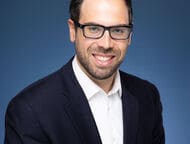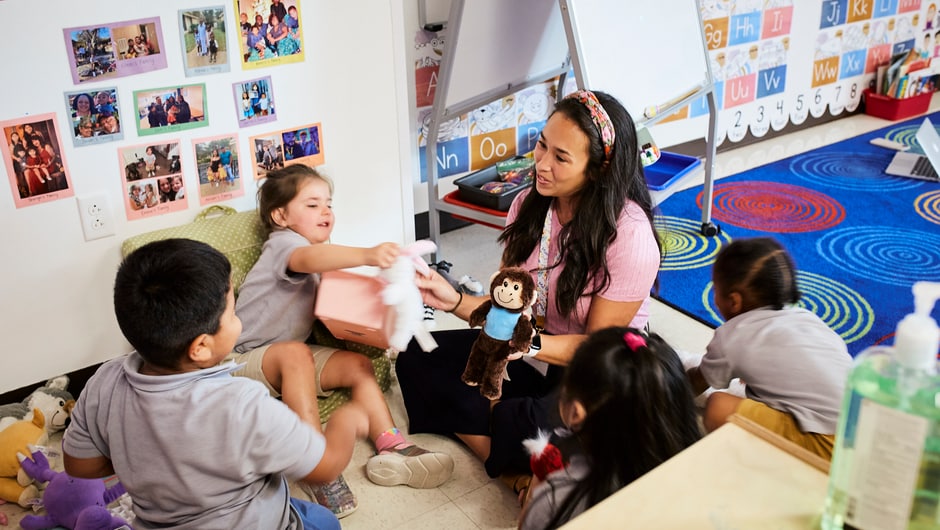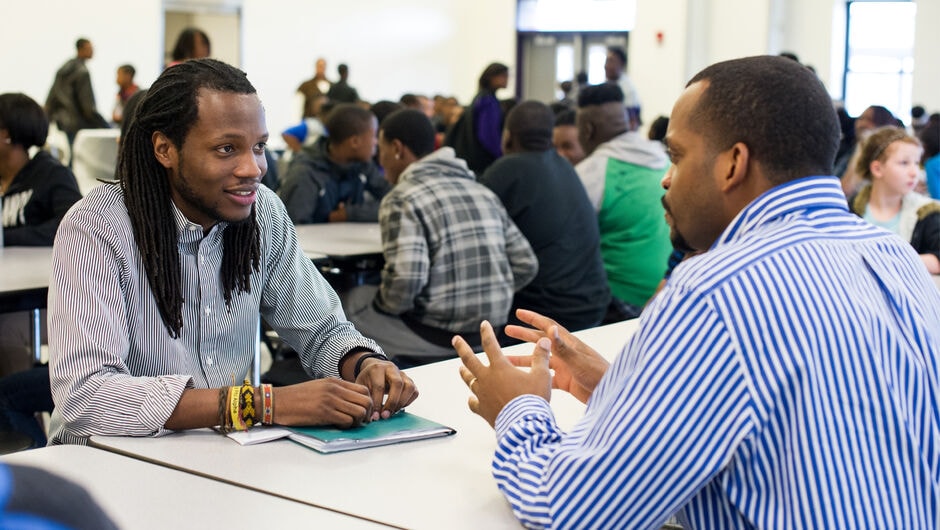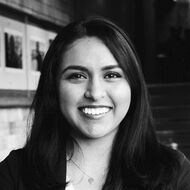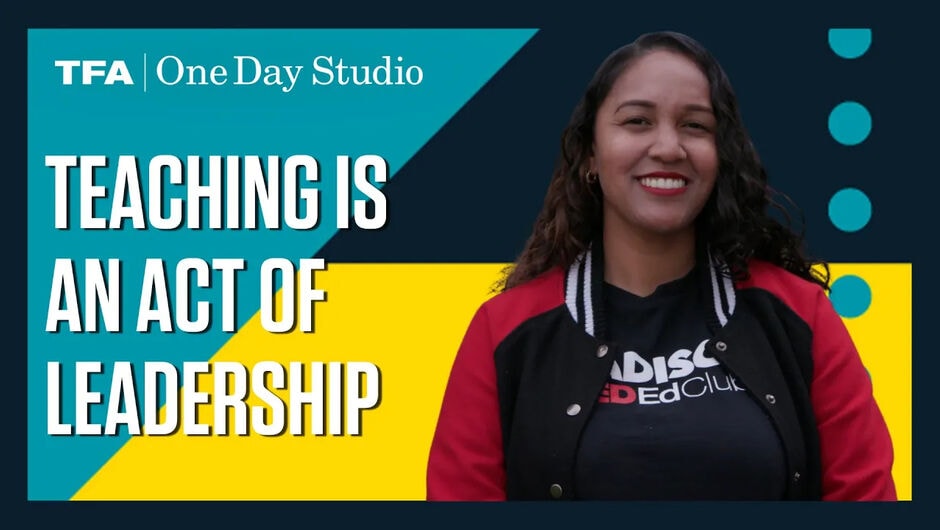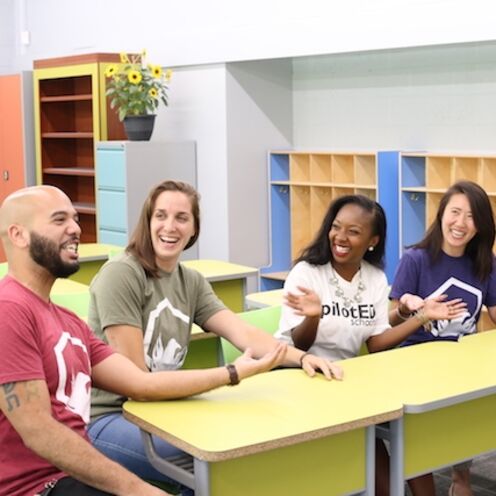
Identity-Based Learning: How PilotED Is Redefining Student Success
The leadership team at pilotED school in Barrington speak about their identity-based innovative K-8 school model, their own K-12 school experiences, and learnings from being a part of the TFA network. #OneDayINdy
Years before pilotED was ideated as a charter school network, its five-person school leadership team—including Jacob Allen, (CEO), Marie Dandie (founding principal), Darreyel Laster (director of culture and community), Jennica Adkins (director of curriculum and instruction), and Lani Luo (director of business and operations)—frequently crossed paths as teachers in professional and social spaces.
The biggest constant in their conversations was the critical need to address the inequitable systems that were negatively impacting thousands of students in Chicago.
Four members—Jacob, Marie, Jennica, and Lani—are Chicago 2013 alumni who met at TFA Institute, while Darreyel taught at Galapagos Charter Schools as a G-Corps Teaching Fellow and ran in the same circles.
Marie and Jacob’s belief that identity played a key role in student success and growth (backed by research by Claude Steele, the University of Chicago, and the NAACP) was first tested in Marie’s second-grade classroom, and its marked success led them to launch an after-school program in several Chicago schools. Today, pilotED is a K-8 charter school in Barrington here in Indianapolis gearing to launch this fall with K-1 students using an innovative curriculum that centers on social identity and civic engagement.

How would you describe your own K-12 school experience as a student?
Jennica: I grew up in suburban Minnesota, in a suburb of Twin Cities. My K-12 experience was predominantly white schools. I was the class clown in high school. I didn’t take school super seriously. It wasn’t until teachers engaged me in things I was interested in that I actually became invested. Things that stand out now are how different it was from my experience as a classroom teacher in Chicago in terms of resource availability and quality of instruction. I think about the fact that everything we’ve learned in K-12, we’re going to learn again. What stands out to me more are the leadership skills formed through sports and extracurriculars that pushed me outside the classroom—which ties into this model. Our students could be getting the best test scores, but if they’re not developed as humans, if we’re not teaching them soft skills to be strong leaders and advocates for themselves, we’re coming up short.
Lani: I started school in China, where the curriculum is the opposite experience of what pilotED is trying to do. I saw school in a traditional, teaching-at-kids way. That’s what I grew up with, and it’s still hard for me to wrap my head around this revolutionary model. The reason I’m so adamant about it is because I saw how teaching at children—forcing rote memory, treating schools like factories—is dangerous. We see how many Asian countries stifle creativity and effective system leadership. They have a great work ethic but when it comes down to creating new things and innovating, that hardly happens in many of those countries.
Darreyel: I’m from Pensacola, Florida. It is in Dixieland—southern through and through. I came from a family of high poverty, rooted in black culture, uneducated, but even given all of that, my mom really fought for me to be a part of a really good school system. She was intentional in placing my older sister and me in high-performing schools. In my school of 600 kids, there were four black kids. I was in kindergarten but my older sister was already in fourth grade, having previously gone to an all-black school. I remember she would come home crying feeling not smart enough, not good enough.
I never thought about identity until high school, where teachers of color were able to articulate why they were pushing me in a certain way, seeing the skills I needed to develop. Mr. Gully pulled me aside to run for president because I was a black man, also asking my friend Lily to run as secretary because she was a black woman. He coached us and encouraged us: You go off to school, then come back and run Pensacola. I always had a dream to go back and become the mayor because he saw something in me that I didn’t see in myself. It became my north star, my push, my motivation. I’m grateful for my K-12 experience because we had aces in places to make sure we got to where we needed.
Jacob: I grew up in LA and moved to suburban Milwaukee for my high school years. I went from a very diverse school in LA to a completely white upper-middle-class school in suburban Milwaukee. As a mixed race brown individual, someone severely obese at the time, gay male, and no money like everyone else, I found that my identity was quite suffocating at times. I didn’t have the words to describe it until I graduated with a degree in Society, Ethics, and Human Behavior, through which I learned about the way we build societal norms and why all these aspects of identity were in conflict with societal norms in Wisconsin. It was the backbone to my life’s work. Identity is one of the most important things to be addressed across the spectrum for all kids in their primary education.
Marie: I was born and raised in Detroit and went to Detroit Public Schools (DPS) for 16 years. I had a really good schooling experience, as every teacher in DPS pushed me. Because I was labeled an at-risk youth, I had access to pre-college and advanced prep programs. On Saturdays, my mom always took me to University of Detroit Mercy academic programming to put me on a path to college. I came from poverty, talked too much, was suspected for fighting, and had anger issues, but my teachers still had high expectations of me. I spent two years at an all-black high school, then my last two years at an all-white suburban high school. When I got to the suburbs, I felt that every single teacher allowed me to fail. I worked hard because I knew I had to—I was always the only black person in my class, sometimes the only person of color.
One of our biggest reasons to start pilotED is so students could be represented. We look like our students, so we can keep high expectations of them. My expectations will not lower because of their backgrounds or identities. I do not want those experiences for youth moving forward.
How did pilotEd come to fruition?
Marie: Before we [leadership team] met at TFA Institute, I was working in DC going to a lot of political forums on education. What was disturbing was that when it came to policies for black and Latinos, they were made by white men. That was a major reason why I joined TFA. I noticed that I was a minority as a teacher in the building, yet all my students looked like me. There were huge cultural differences where teachers and students didn’t share a racial or socioeconomic identity. There were harsher disciplinary practices because teachers didn’t understand the culture of their students. As a result, the students’ misbehaviors manifested even more because of their poverty, hood, and gang violence experiences were left out of the classroom.
Jacob: There were very clear lines in Chicago of where great schools were—traditionally white parts—and other areas that were impoverished where there were many blacks and Latinos with every school failing. For all that to exist in one district, all public schools, it was unsettling. The college graduation rate for blacks and Latinos under age 25 was about 14 percent, which was horrendous.
Kids were getting killed every single day. We hypothesized that kids’ identities were the largest factors in their educational success, not just standardized test scores or GPA, but we didn’t see any schools grounded in social identity conversations about race, empowerment, gender.
Marie: What I did then was build these identity-based themes into a curriculum for my second-graders, to test what that could make happen. My kids ended up outperforming other second grade classrooms. Afterward, we started developing and implementing an after-school curriculum for middle school students—I remember my experience in middle school being transformational, and Jacob felt the same about his. When going down this or that path, the middle school helped me start figuring out who I am and how I fit into this world. As more and more schools wanted us to implement the pilotED program in their buildings, we realized we needed to bring out a full school starting with kindergarten because kids as young as three years old start developing biases.
The sooner we can get kids to appreciate who they are and respect the experiences of others, the better our whole community will be.

Why did you choose to open your founding school in Indy?
Jacob: We knew we were doing our after-school program at a hectic time politically in Chicago. Fifty-three public schools had recently closed down. There was a wide spectrum on charter school quality, with the poor-performing charters around the city gaining the most publicity. There were also budget cuts happening almost every year. We were adamant about evolving from an after-school program to a charter network but realized there would be significant challenges.
After we were featured in Forbes, I got calls from foundations, including one in Indy—The Mind Trust. They said, Hey, the politics and funding prospects aren’t great in Chicago, but does it matter that you start there? We thought, we eventually want to expand into a national network. Where we start isn’t as important.
Marie: I was initially very hesitant, as Indiana is a red state that tolerated things I was not used to living with. However, when we visited, I really appreciated seeing the partnerships between charter and public schools, with the IPS school board, and the support of the Mayor’s Office. There were entities working together. In Chicago, charter schools didn’t talk to other schools. It’s not the case here. Indy has created an ecosystem where pilotED can at least be communicating down the street to other charters serving the same community. I appreciate the community effort in educating kids—these are not just single-sight schools.
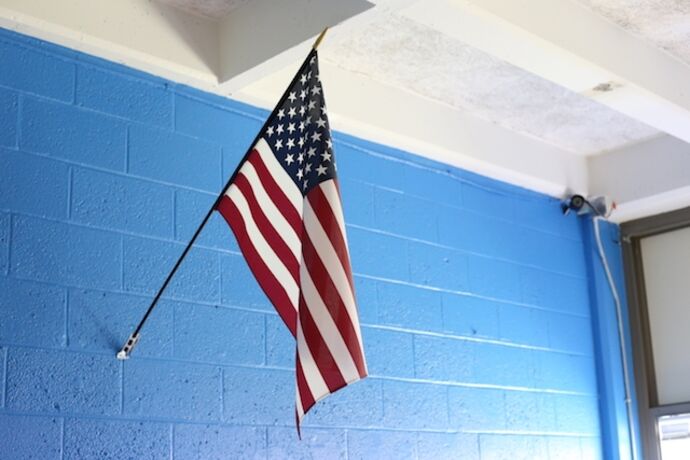
To what extent did TFA play a role in supporting your goals?
Jacob: TFA had relationships with everything and everyone under the sun, and it was absolutely necessary to make things happen. Otherwise, we were just a group of passionate people talking about things. We had no funding, no organizational structures, and no accountability. In order for pilotED to get off the ground, it was crucial to have dollars, press, a logo, t-shirts someone was willing to fund, to turn this into a real thing. TFA provided everything. There were top-notch people who knew how to raise money, passionate teachers who could explain why educational equity was important, principals to share ideas, schools to visit, politicians to learn from. If it exists, TFA had someone doing it at a high level. It connected us to an expansive network of people and events. We all have backgrounds in various industries—none of us are born educators. But TFA brought our past lives and skills together.
Marie: I didn’t plan to go into teaching. I planned to do TFA, then move to DC after two years. TFA allows people to have diverse career paths to contribute to a productive economy that starts in the school building. It put significant effort into trying to make everyone aware of the cultures they were heading into. I hated TFA’s Saturday professional development (PD) days back then, but when I think about where I am now, all of those PDs, affinity spaces, cohort dinners literally shaped the way I see and view and work in education.
In addition, I was able to pursue a fellowship with LEE and work on high levels of policy at the Fordham Institute, researching Chicago specifically. This allowed me to be more knowledgeable when I stood in front of Chicago Public Schools while trying to launch our charter. The experience was transformational in my leadership and helped make pilotED a reality. Today, we have first-year teachers coming from the TFA-Indy corps. We greatly value TFA as a partner in providing us talent: kindergarten, Spanish, and second-grade teachers. We’re trying to reciprocate by giving TFA what they gave us. It’s weird that we’re now on the other side of the table.
To learn more about pilotED, visit their website.
Sign up to receive articles like this in your inbox!
Thanks for signing up!
Content is loading...



